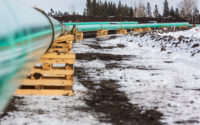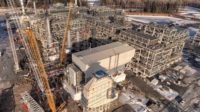The controversial Trans Mountain oil pipeline expansion, owned by Canada's government, gained a fast approval from federal energy regulators on Jan. 12 to its second plea for a pipe construction variance along a 2.3-kilometer section in harder rock than anticipated, despite hours of questioning of project managers earlier that day.
The regulators had denied the variance last month to complete one of the last sections of the federally-owned line from Edmonton, Alberta, to Burnaby, B.C., a 980-km expansion. They allowed the variance to take effect immediately but said an explanation of the change would be issued at an unspecified future date.
Developer Trans Mountain Corp., a government-owned company, had claimed the project schedule and cost would be affected if it could not use pipe with a different diameter, wall thickness and coating in a revised route through the area.
Kiewit Ledcor Sicim Limited Partnership is principal construction contractor for the pipeline in the affected area of its route in British Columbia.
The estimated $22.5-billion project would nearly triple oil shipping capacity to 890,000 barrels per day for export, but it has faced major impacts from inflation, labor and supply chain challenges that have delayed its start and quadrupled its cost.
Regulators questioned project engineers for nearly five hours on the design, wall thickness, materials and inspection procedures in using 30-in. diameter pipe instead of 36-in. originally outlined. In the approval, they imposed a number of conditions on project builders, including testing and documentation requirements for pipe materials.
The pipeline was set to be finished by the end of the first quarter and operate within one month of mechanical completion. In a statement Trans Mountain said the project was "98% complete."
One Trans Mountain manager termed the project a “constant iterative process … to solve the next problem," but remained “cautiously optimistic” the issue currently before the panel “is the last one.”
"With line fill expected to begin by the end of March, taking up to 22 days ... the pipeline expansion should be set to begin commercial operations by the end of April if all goes according to plan," said energy sector consultant RBN Energy. "This will be an important direct conduit to international markets for the export of much larger volumes of Canadian crude oil from Canada’s West Coast, reducing the nation’s reliance on crude exports to the U.S."
But in a statement on Jan. 29, Trans Mountain said unspecified "technical issues" in horizontal directional drilling in the last section will need more time for managers to determine how to proceed "minimizing further delay."
The problems related to an obstruction discovered in one area of planned pipe installation, with removal options now being assessed, a company spokesperson told CBC News. There was no update any new project startup date pushback.
Company officials testified the project faced about $200 million in lost revenue for each month of delay. Last November, they reported operating costs of $37.7 million for the third quarter, which were 25% higher than for the same period one year earlier, and posted a quarterly net loss of nearly $540 million due to a goodwill impairment writedown of $651 million that was attributed mostly to rising capital costs.
The government is intending to sell the line in advance of national elections expected by 2025, but there is growing concern among Canadians about government writedowns of its cost.






Post a comment to this article
Report Abusive Comment